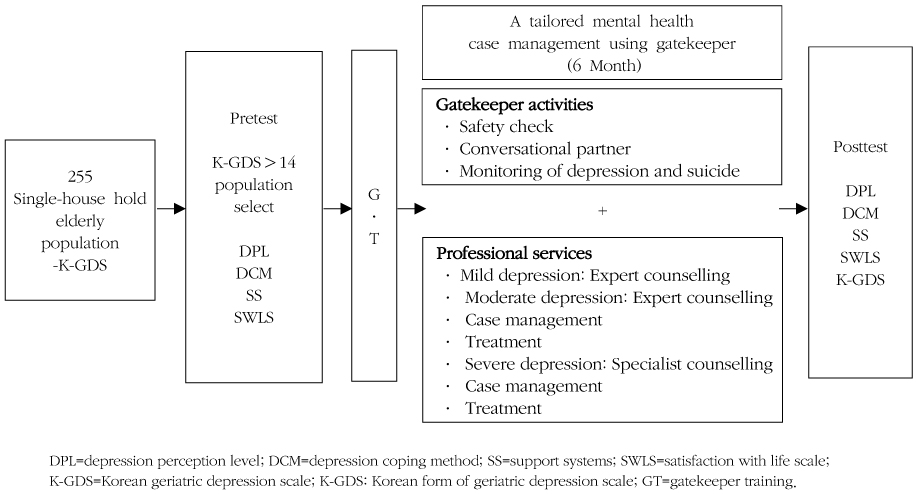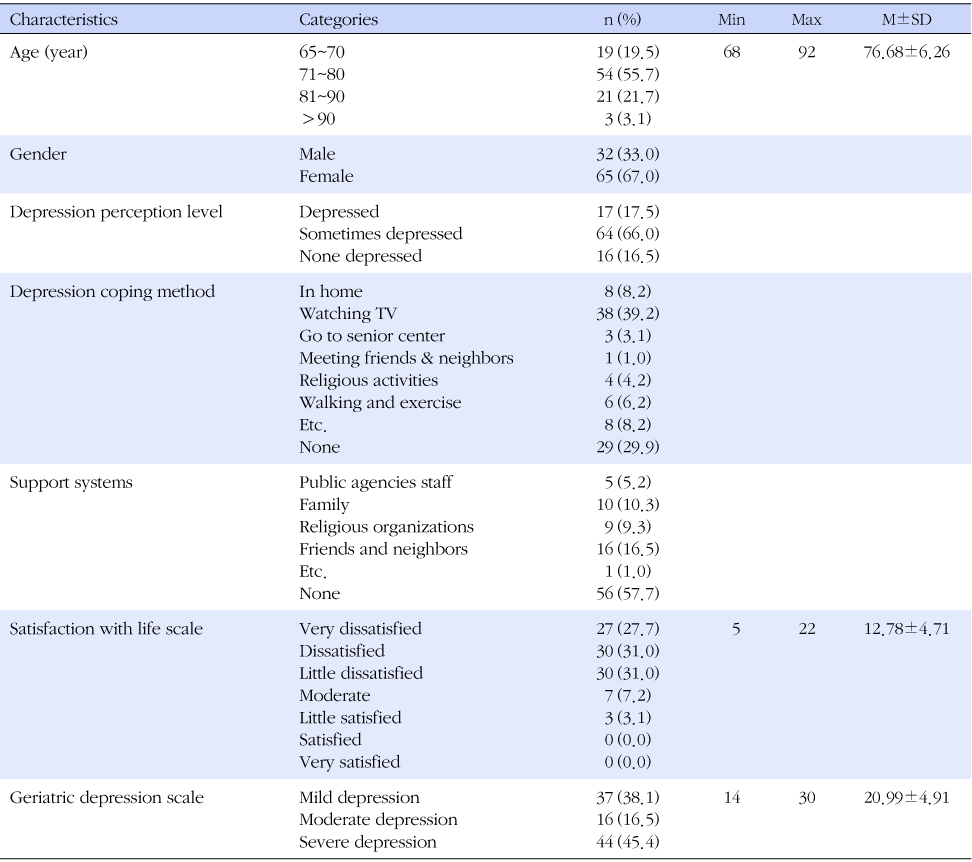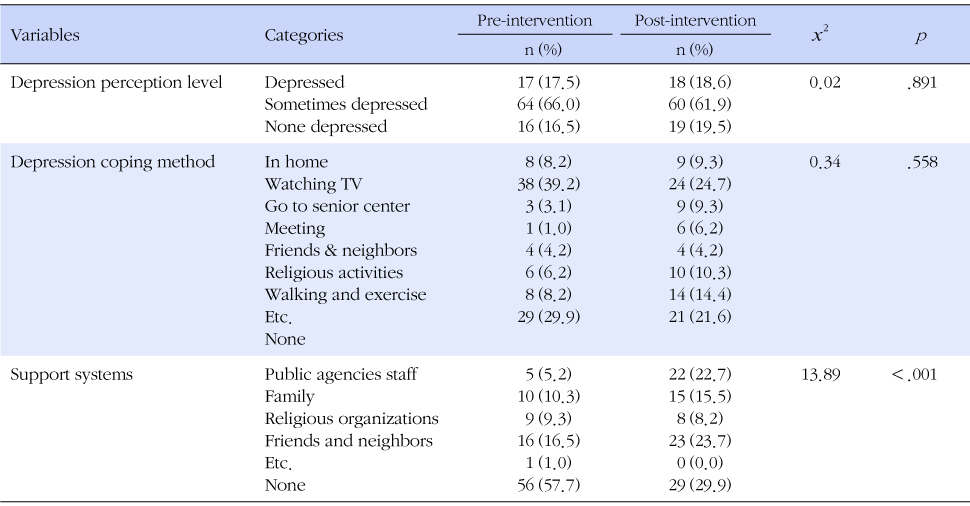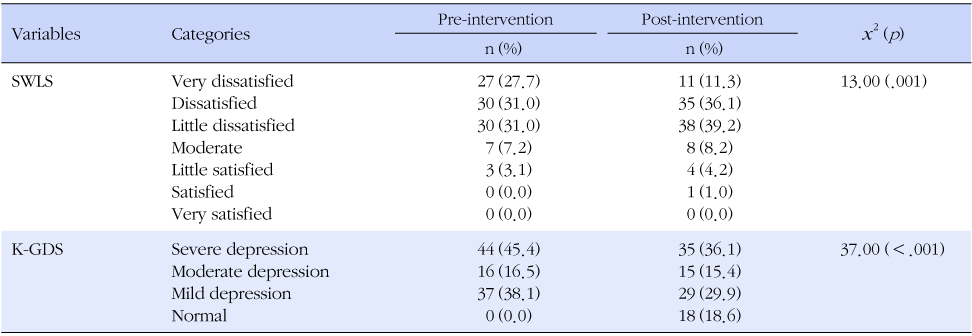References
1. Choi SJ, Cha HB, Kim IK, Suh HK. A comparative study on long - term care policy for the elderly in Korea and Japan. J Korea Gerontol Soc 2000. 20(3)143–167.
2. Diener E, Emmons RA, Larsen RJ, Griffin S. The satisfaction with life scale. J Pers Assess 1985. 4971–75.
3. Farrer L, Leach L, Griffiths KM, Christensen H, Jorm AF. Age differences in mental health literacy. BMC Public Health 2008. 8125.
4. Fiori KL, Antonucci TC, Akiyama H. Profiles of social relations among older adults: A cross-cultural approach. Ageing Soc 2008. 28203–231.
5. Harber J, Krainovich-Miller B, McMahon LA, Price-Hoskins P. Comprehensive psychiatric nursing 1997. 5th edth ed. St. Louis, MO: Mosby;
6. Hwang MG, Kim EJ. The effect of subjective quality of life and self-esteem on suicide ideation among the older adults: Focused on the mediating effect of depression. J Korean Gerontol Soc 2008. 28(4)865–885.
7. Jung SD, Koh MY. A study on the effectiveness of team approach in case management service for the elderly in Puchon. Korean J Soc Welf 2003. 54273–294.
8. Jorm AF. Mental health literacy: Public knowledge and beliefs about mental disorders. Br J Psychiatry 2000. 177396–401.
9. Jorm AF, Nakane Y, Christensen H, Yoshioka K, Griffiths KM, Wata Y. Public beliefs about treatment and outcome of mental disorders: A comparison of Australia and Japan. BMC Med 2005. 312.
10. June KJ, Lee JY, Yoon JL. Effects of case management using resident assessment instrument-home care (RAI-HC) in home health services for older people. J Korean Acad Nurs 2009. 39(3)366–375.
11. Jung IK, Kwak DI, Joe SH, Lee HS. A preliminary study on standardization of Korea form of geriatric depression scale (GDS). J Korean Neuropsychiatr Assoc 1998. 37(2)340–351.
12. Kang SK, Kim HJ. A study of impact of social activities and religion/spirituality on depression and life satisfaction among the Korean elderly. Korea J Popul Stud 2011. 34(2)163–190.
13. Kim EJ, Yoon GH. Effect of peer consult for elderly suicide prevention. Korean J Res Gerontol 2010. 19115–131.
14. Kim KS, Moon JW, Park JW. The analysis on mental health of the elderly in korea. Health Soc Sci 2008. 23105–132.
16. Lee EJ, Bae SK, Um TY. A study on the influence of depression and leisure participation on attempted suicide among the elderly who lives alone. J Korean Gerontol Soc 2010. 30(2)615–628.
17. Lee JS, Kim SJ. A study on the effectiveness of case management for rehabilitation of the chronic mentally illness. J Korean Acad Psychiatr Ment Health Nurs 2002. 11(2)206–220.
18. Lee KY, Bae ES, Park HG. The study on the effectiveness of integrated case management of community society for the In-home elderly in urban-rural complex areas. J Community Welf 2011. 39(12)75–100.
19. Lee SH, Ko JE. Factors affecting the ability of older adults to identify symptoms of depression. J Korean Gerontol Soc 2009. 29(2)529–546.
20. Lewis M, Lewis A. Peer helping programs: Helper role, supervisor training and suicidal behavior. J Couns Dev 1996. 74(3)307–313.
21. Lin QL, Kim HK, Ann JS. Relationship between depression and quality of life in elderly women living alone: The moderating and mediating effects of social support and social activity. J Korean Gerontol Soc 2011. 31(2)33–47.
22. Mclntosh JL. Suicide prevention in elderly(age 65-99). Suicide Life Threat Behav 1995. 25(1)180–192.
24. Oh IG. The impact of social network and hopelessness on suicide ideation among the low-income adults -focus on interaction effect of use of community welfare center service-. Int J Welf Aged 2009. 44111–130.
25. Park JS, Oh YJ. The effect of case management for clients with hypertension, DM registered in customized home visiting health care services. J Korean Acad Public Health Nurs 2010. 24(1)135–150.
26. Pfeiffer E, Davis CI. Determinants of sexual behavior in middle and old age. J Am Geriatr Soc 1972. 20(4)151–158.
27. Rothman J. A model of case management toward empirically based. Soc Work 1991. 36(6)520–528.
28. Ryu K, Kang YW. The emotional experiences and coping styles of depressive and normal elderly persons. Korean J Clin Psychol 2009. 28(3)893–910.
29. Yang SO, Kwon MS, Choi YJ, Lee SH. The effects of a case management program of customized home visiting health service for clients with arthritis. J Korean Acad Community Health Nurs 2011. 22(2)151–161.
30. Yesavage JA, Brink T, Rose T, Lum O, Huang V, Adey M, et al. Development and validation of a geriatric depression screening scale: A preliminary report. J Psychiatr Res 1983. 1737–49.




